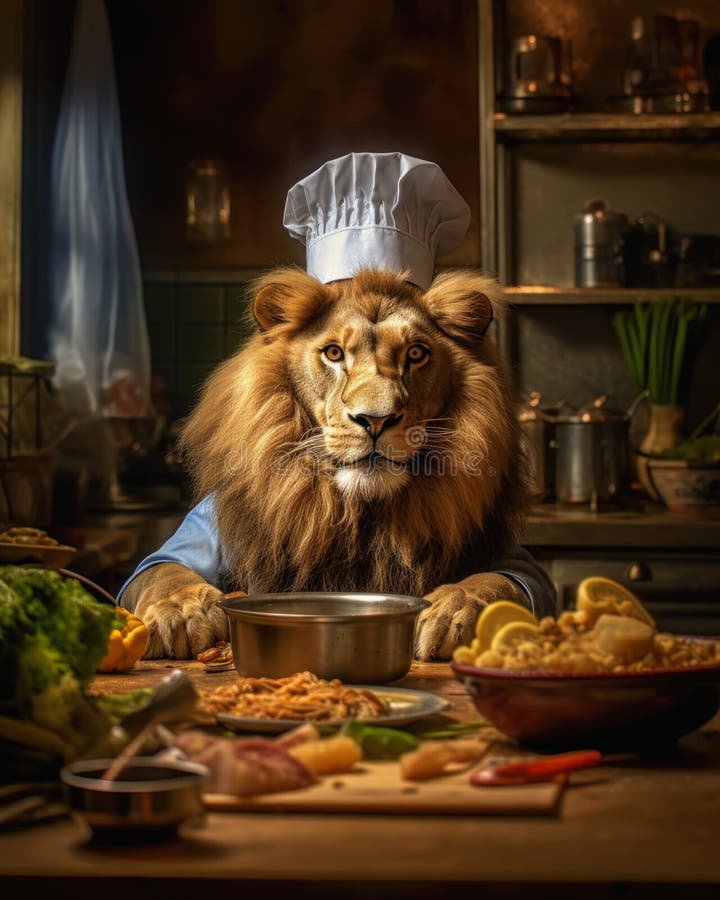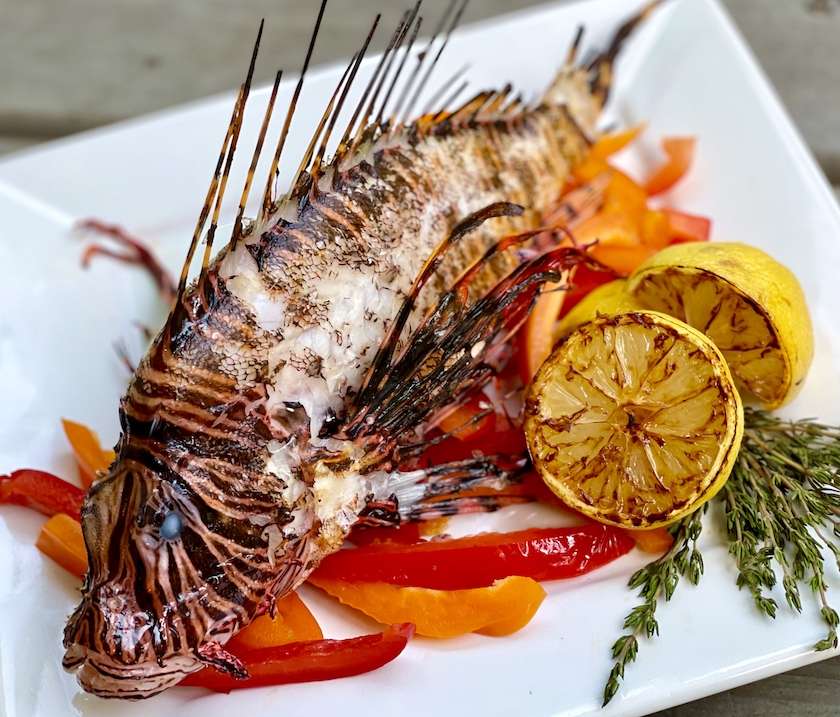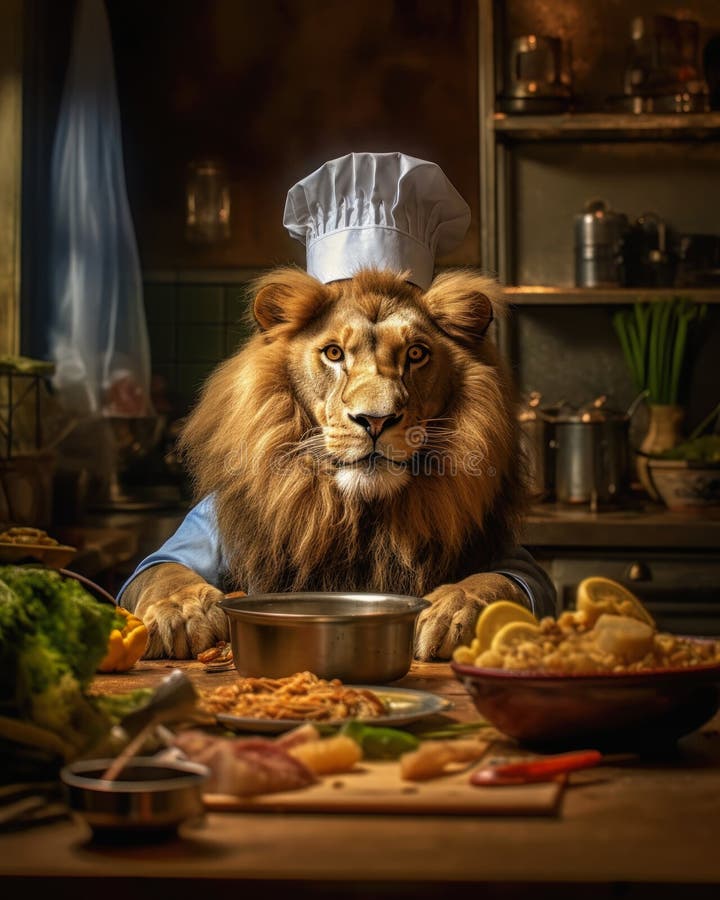Imagine a world where you can enjoy a delicious meal while also making a positive impact on the environment. Conservation Through Culinary Arts is an innovative movement that aims to do just that by promoting lion-friendly cuisine. By creating dishes that use alternative ingredients and raising awareness about the importance of conservation, this movement seeks to protect and preserve these majestic creatures for future generations. Let’s explore how this groundbreaking initiative is not only satisfying our taste buds but also contributing to the conservation of lions in the wild.

The Importance of Conservation Through Culinary Arts
Conservation through culinary arts is a powerful tool that allows us to create awareness about important global issues while also enjoying delicious food. One area where this approach can make a significant impact is in lion conservation. Lions, the majestic kings of the savannah, are facing numerous threats that have led to a significant decline in their population. By promoting lion-friendly cuisine, we can not only support the conservation efforts but also strive to preserve the future of these iconic creatures.
Creating Awareness about Lion Conservation
To truly make a difference in lion conservation, it is crucial to create awareness among individuals. Culinary arts provide a unique platform to engage people in the cause. By showcasing lion-friendly cuisine in restaurants, food events, and media, we can capture the attention and curiosity of the public, triggering important conversations about the threats faced by lions and the urgency of their conservation.
The Role of Culinary Arts in Conservation
Culinary arts have the power to inspire, educate, and influence behavior. Chefs, with their culinary expertise, have a unique opportunity to advocate for lion conservation by incorporating the principles of sustainability and ethical sourcing into their cooking. By creating lion-friendly dishes, these culinary artists can serve as ambassadors for the cause, spreading the message to a wider audience and igniting a passion for conservation.
Promoting Sustainable Practices in the Food Industry
The food industry plays a significant role in both contributing to and mitigating environmental issues. By promoting sustainable practices in the food industry, we can reduce the overall impact on the environment, including the habitats of lions. From farm to fork, every step of the supply chain can be optimized to ensure ethical sourcing, reduced waste, and minimal environmental footprint. By embracing sustainable practices, we can create a positive impact not only on lion conservation but also on the overall health of our planet.
Understanding Lion-Friendly Cuisine
What is Lion-Friendly Cuisine?
Lion-friendly cuisine refers to a culinary approach that supports lion conservation by incorporating sustainable practices and ethical sourcing. It involves selecting ingredients that do not contribute to the destruction of lion habitats or threaten their survival. Through thoughtful ingredient choices, responsible cooking techniques, and conscious menu development, lion-friendly cuisine aims to promote a harmonious coexistence between humans and lions.
Principles of Lion-Friendly Cuisine
The principles of lion-friendly cuisine revolve around three key aspects: ethical sourcing, sustainable practices, and conservation education. Ethical sourcing ensures that ingredients are procured from suppliers who prioritize the well-being of animals and the environment. Sustainable practices encompass responsible farming methods, reduced waste, and a commitment to biodiversity conservation. Lastly, conservation education aims to raise awareness among chefs, diners, and food enthusiasts about the importance of lion conservation and the steps they can take to support the cause.
Benefits of Lion-Friendly Cuisine
Embracing lion-friendly cuisine offers numerous benefits for both the environment and the culinary world. By choosing ingredients that are sustainably sourced, we can reduce the demand for products that contribute to deforestation or the destruction of animal habitats. Additionally, lion-friendly cuisine allows chefs to explore unique flavors and ingredients, adding diversity to their culinary repertoire. Furthermore, by aligning their practices with sustainability, chefs can attract environmentally conscious diners and establish themselves as leaders in the industry.
Creating Lion-Friendly Dishes
Exploring Lion-Friendly Ingredients
Creating lion-friendly dishes starts with carefully selecting ingredients that align with the principles of sustainability and ethical sourcing. Choosing locally sourced produce, organic ingredients, and supporting fair-trade suppliers are key aspects of this approach. By embracing lion-friendly ingredients, chefs can ensure that their dishes contribute to the preservation of lion habitats rather than their destruction.
Incorporating Traditional African Flavors
Incorporating traditional African flavors is a beautiful way to celebrate the rich cultural heritage of the lion’s native land while also promoting lion conservation. By using spices, herbs, and cooking techniques inspired by African cuisine, chefs can transport diners on a culinary journey, deepening their appreciation for the cultural significance of lions and their habitat.
Innovative Cooking Techniques for Lion-Friendly Dishes
Creating lion-friendly dishes involves embracing innovative cooking techniques that maximize flavors while minimizing waste. Chefs can explore techniques like nose-to-tail cooking, which ensures the utilization of every part of an animal, reducing waste and promoting sustainability. Additionally, adopting techniques that require less energy and water, such as sous vide or fermentation, can contribute to the overall sustainability of the culinary process.
Collaborations Between Conservation Organizations and Chefs
The Importance of Collaboration
Collaboration between conservation organizations and chefs is vital in the fight for lion conservation. By joining forces, these two groups can leverage their unique skills, knowledge, and networks to create a powerful impact. Conservation organizations offer scientific expertise and conservation strategies, while chefs bring creativity, influence, and a platform to reach wider audiences. Together, they can amplify the message and achieve tangible results.
Case Studies of Successful Partnerships
Numerous successful partnerships between conservation organizations and chefs have paved the way for lion-friendly cuisine. Collaborations such as the Lion-Friendly Chefs initiative, which brings together chefs committed to sustainable sourcing and responsible cooking, have not only garnered attention but also led to tangible conservation outcomes. Such partnerships serve as role models, inspiring others to recognize the potential of collaboration in driving positive change.
Sharing Best Practices
Collaborations between conservation organizations and chefs can also provide a platform for sharing best practices. By exchanging knowledge, experiences, and success stories, the culinary industry can collectively work towards more sustainable and conservation-minded practices. This sharing of expertise ensures that chefs have access to the latest research and conservation strategies, allowing them to continuously improve their efforts in promoting lion-friendly cuisine.

Promoting Lion-Friendly Cuisine in Restaurants
Menu Development and Specials
Promoting lion-friendly cuisine in restaurants requires strategic menu development. Chefs can highlight lion-friendly dishes by featuring them as specials or signature items on their menus. This not only creates a buzz around the cuisine but also helps raise awareness among diners about the importance of lion conservation. By offering unique and delicious lion-friendly options, restaurants can attract diners looking for sustainable and socially responsible dining experiences.
Educating Customers about Lion Conservation
To maximize the impact of lion-friendly cuisine, it is crucial to educate customers about lion conservation and the significance of their dining choices. Restaurants can incorporate educational elements into their menus, providing diners with information about the ingredients, their sustainability, and the conservation efforts they support. By engaging customers in a dialogue about lion conservation, restaurants can inspire them to become advocates for the cause.
Collaborating with Local Farmers and Suppliers
Building sustainable partnerships with local farmers and suppliers is another essential aspect of promoting lion-friendly cuisine in restaurants. By collaborating with suppliers who prioritize sustainable farming practices, chefs can ensure the quality, freshness, and ethical sourcing of their ingredients. Moreover, such collaborations contribute to the local economy, supporting farmers who embrace sustainable practices and encouraging a sense of community and shared responsibility.
Educational Programs and Culinary Schools
Incorporating Lion Conservation into Culinary Education
Integrating lion conservation into culinary education is crucial to cultivate a new generation of conservation-minded chefs. Culinary schools can incorporate modules or courses that focus on the principles of sustainability, ethical sourcing, and lion conservation. By providing aspiring chefs with the knowledge and tools to create lion-friendly cuisine, culinary education plays a pivotal role in shaping the future of the industry.
Internships and Experiential Learning
Internships and experiential learning opportunities offer aspiring chefs the chance to gain hands-on experience in lion-friendly cuisine. By partnering with conservation organizations, culinary schools can provide students with unique internships that allow them to explore wildlife conservation and sustainable farming practices. These real-world experiences not only enhance their culinary skills but also instill a deeper understanding of the importance of biodiversity conservation.
Creating a New Generation of Conservation-Minded Chefs
The ultimate goal of incorporating lion conservation into culinary education is to foster a new generation of chefs who prioritize sustainability and conservation. By instilling these values from the outset, culinary schools can shape the practices and mindset of future industry professionals. These conservation-minded chefs have the potential to make a lasting impact on the culinary world, promoting lion-friendly cuisine and driving positive change throughout their careers.

Media and Influencers as Agents of Change
Promoting Lion-Friendly Cuisine through Social Media
Social media platforms provide a powerful tool for promoting lion-friendly cuisine to a vast audience. Chefs, food bloggers, and influencers can utilize these platforms to showcase lion-friendly dishes, share recipes, and raise awareness about the importance of lion conservation. By harnessing the viral nature of social media, we can create a global movement and generate widespread support for the cause.
Working with Celebrity Chefs and Influential Food Bloggers
Celebrity chefs and influential food bloggers have a significant impact on culinary trends and consumer behavior. By collaborating with these influential figures, conservation organizations and culinary professionals can leverage their reach and influence to promote lion-friendly cuisine. By featuring lion-friendly dishes, recipes, or stories in their shows, cookbooks, or blogs, these tastemakers can inspire their followers to embrace sustainable dining choices and support the conservation efforts.
Documentaries and TV Shows on Lion Conservation and Culinary Arts
The power of visual storytelling should not be understated in promoting lion-friendly cuisine. Documentaries and TV shows that highlight the intersection of lion conservation and culinary arts can captivate audiences, taking them on a journey to understand the importance of sustainable practices in the culinary world. These powerful mediums enable viewers to connect emotionally with the cause, inspiring them to make conscious choices and support lion-friendly cuisine.
Supporting Local Communities
Empowering and Engaging Local Communities
Supporting local communities is a fundamental aspect of lion conservation. By empowering and engaging local communities, we can create a sustainable model that benefits both people and wildlife. Culinary arts can play a crucial role in this process by providing economic opportunities and fostering a sense of pride in local cuisine and cultural heritage. By involving local communities in the promotion of lion-friendly cuisine, we can ensure their active participation in conservation efforts.
Economic Benefits of Lion-Friendly Cuisine
Lion-friendly cuisine not only supports conservation efforts but also brings economic benefits to local communities. By sourcing ingredients locally, working with local farmers, and promoting traditional African flavors, lion-friendly cuisine creates a demand for local products, generating income and employment opportunities. This economic incentive provides local communities with a vested interest in preserving both their culinary heritage and the habitats of the magnificent lions.
Promoting Cultural Heritage through Food
Food is deeply intertwined with culture and heritage. By promoting lion-friendly cuisine, we have the opportunity to celebrate and preserve the culinary heritage of the regions where lions roam. Through traditional recipes, cooking techniques, and the use of local ingredients, lion-friendly cuisine becomes a vehicle for cultural preservation. By embracing lion-friendly dishes, we can not only support conservation but also cherish the rich cultural tapestry that forms the backdrop of lion habitats.

Sustainable Sourcing and Supply Chains
The Role of Sustainable Agriculture in Lion-Friendly Cuisine
Sustainable agriculture plays a pivotal role in the promotion of lion-friendly cuisine. By adopting farming practices that prioritize biodiversity conservation, soil health, and water conservation, farmers can ensure the sustainability of the ingredients used in lion-friendly dishes. Sustainable agriculture also minimizes the use of harmful chemicals, reduces soil erosion, and protects the integrity of the ecosystems that lions depend upon for their survival.
Reducing Food Waste and Environmental Impact
Reducing food waste is another critical aspect of sustainable sourcing in lion-friendly cuisine. Chefs can employ techniques like root-to-stem cooking and creative use of leftovers to minimize waste in their kitchen. Additionally, implementing composting and recycling programs further reduce the environmental impact of food preparation. By embracing sustainable practices, chefs can ensure that the journey from farm to fork has minimal waste and environmental damage.
Creating Partnerships with Ethical Suppliers
Collaborating with ethical suppliers is key to achieving sustainable sourcing in lion-friendly cuisine. Chefs can establish partnerships with suppliers who adhere to responsible fishing practices, maintain fair trade standards, and prioritize animal welfare. By supporting these ethical suppliers, chefs contribute to a larger network of sustainable practices, ensuring that their lion-friendly dishes are truly aligned with the principles of ethical sourcing.
Future Directions and Opportunities
Expanding the Reach of Lion-Friendly Cuisine
The potential for lion-friendly cuisine is vast, with opportunities to expand its reach. By continuing to promote lion-friendly dishes in restaurants, food events, and media, we can reach a wider audience and inspire greater support for lion conservation. Collaboration between conservation organizations, chefs, and other stakeholders can facilitate the development of innovative initiatives, such as pop-up events, food festivals, and educational campaigns, to further spread the message and impact.
Collaborating with the Tourism Industry
Collaborating with the tourism industry presents another avenue to promote lion-friendly cuisine. By partnering with hotels, lodges, and tour operators, culinary professionals can introduce lion-friendly dishes to travelers and tourists, showcasing the connection between sustainable dining choices and the preservation of the wildlife they come to experience. Tourism provides a unique platform to engage individuals from all walks of life, making it an ideal channel to educate and advocate for lion conservation.
Incorporating Lion Conservation into Food Policies
Incorporating lion conservation into food policies is a forward-thinking approach that can drive lasting change. Governments, international organizations, and culinary associations can work together to develop policies that prioritize sustainable practices, ethical sourcing, and conservation education. By formalizing these guidelines and regulations, we create a framework that supports the growth of lion-friendly cuisine and ensures its long-term impact on lion conservation.
Conservation through culinary arts is a powerful force that can drive positive change in the world. By promoting lion-friendly cuisine and embracing sustainable practices, we can not only tantalize our taste buds but also contribute to the preservation of one of the most iconic creatures on our planet. With collaboration, education, and innovation, we can build a future where delicious food and biodiversity conservation go hand in hand. Let’s take a bite out of lion conservation and savor the journey towards a sustainable future.


